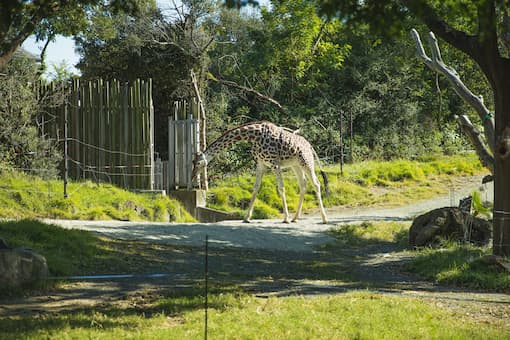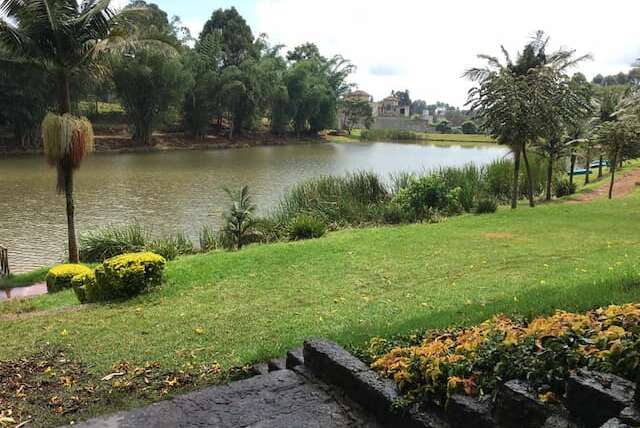Nguuni Nature Sanctuary is an eco-tourism wonder of a desolate land transformed through reclamation. The Nguuni Nature Sanctuary entry fee and financial support through the Baobab Trust have kept the Sanctuary’s operations at excellent standards.
Nguuni Sanctuary is near Nguu Tatu Hills on the North Coast of Mombasa. It is another of Dr. Rene Haller’s successful conservation stories through the Baobab Trust project.
Like the sister Sanctuary Haller Park, Nguuni Nature Sanctuary is now a hallmark of nature’s beauty. This beauty is captured and restored through human intervention.
These merits are evident in the general upkeep of the park, the state of flora and fauna, and the hospitable and knowledgeable staff.

The Beauty Seen Through the Nguuni Nature Sanctuary Entry Fee
Like the legendary sphinx, Nguuni Nature Sanctuary rose from the ruins of a former Bamburi Cement quarry.
Today, it is a scenic and serene nature sanctuary complete with wetlands, lakes, and savannah grasslands.
In addition, Nguuni Nature Sanctuary in Mombasa, Kenya, is home to diverse avifauna.
These include the pink-backed pelican, Egyptian geese, the yellow-billed stork, and the white-faced whistling duck.
Furthermore, various wildlife gives this Sanctuary a rank among notable tourist destinations. Some popular animals include waterbucks, ostrich, giraffes, eland, oryx.
The beauty of paying the Nguuni Nature Sanctuary entry fee is the chance to behold this wildlife. There is also the opportunity to see the botanical wonders around this paradise up close during a nature walk.
Nguuni Nature Sanctuary Entrance Fee and other costs
Visitors pay for Nguuni Nature Sanctuary tickets at the gate to gain entrance into the Sanctuary. The management has different fees for resident and non-resident visitors.
Nguuni Nature Sanctuary entry fee
- Non-residents – Kshs 800 per adult and Kshs 300 per child
- Residents – Kshs 350 per adult and Kshs 100 per child
There are special discounts on Nguuni Nature Sanctuary fees for students. Group rates apply for special parties holding events at the park.
The management encourages interested parties to contact them before the visit to discuss the rates, other requirements, and arrangements.
Where is Nguuni Nature Sanctuary Located?
Among the tourist attractions in Bamburi, Mombasa, the unique Nguuni Nature Sanctuary location is on the Nguu Tatu Hills, 4 kilometres from the Lafarge Bamburi Cement.
The 7-square-kilometres Sanctuary is off Kiembeni Road, ten minutes from the Bamburi beach.
The easy-to-follow Nguuni nature sanctuary directions advise visitors to get to the Sanctuary in two ways. First, by tuk-tuk or taxi, which is the equivalent of public transport.
Secondly, via a self-drive Safari using a 4-wheel drive vehicle that can safely navigate the safari trails and roads.
The Sanctuary is 7.4 km from Mombasa via the Old Malindi Road, a 20 minutes drive.
Contacting Nguuni Nature Sanctuary
For tours, booking, and camping queries, the Sanctuary’s phone contacts are +254700337068 and +254721357876. Their email is nguuninaturesanctuary@thebaobabtrust.com
Things to Do at Nguuni Nature Sanctuary
As a wildlife sanctuary and Nature Park and its unique location around Bamburi town, the Sanctuary is a favourite and convenient destination.
It receives many local and international students, botanical and zoological researchers, families, and tourists.
The picturesque scenery also becomes a backdrop for parties and wedding receptions, while the trails favor cycling and walking.
Moreover, the rustic Bandas-like gazebos are ideal for barbecue cookouts, and the inviting manicured grounds are beautiful picnic sites.
The giraffes gracefully stroll about among the guests who enjoy feeding them. The whole Sanctuary is one awesome spot for photography and video shoots.
READ ALSO: https://snippetsofnairobi.com/animal-orphanage-nairobi-entrance-fees/
Which Is The Best Time To Visit Nguuni Nature Sanctuary?
The Sanctuary seems to be an excellent site all year round as it hosts seasonal birds from distant lands across the oceans.
In January and February, the long-tail Cormorant makes a stopover, while in July and August, birdwatchers have another treat in sighting the fulvous whistling duck.
Besides the brown snake eagle that comes by in September and October, many other rare and foreign birds descend on Nguuni during their annual migrations.
In addition, the beautiful avifauna that calls Nguuni Sanctuary home remains in the park to enthral visitors all year round.
The park’s opening hours are 9 am to 5 pm from Monday to Saturday and until 7 pm for the spectacular sundowners. On Sundays, it stays open from 10 am to 5 pm.
For birdwatchers, the park stays open daily from 6.30 am to 10.30 am and from 3.30 pm to 5 pm, quite like Nguuni’s happy hour.
Conclusion
The Nguuni Nature Sanctuary entry fee is the gate pass to the spellbinding paradise reminiscent of Jurassic Park.
The great botanical exploits, still azure waters, and wildlife roaming free and close are the memorable experience of a visit to the surreal Nguuni Nature Sanctuary.
There will always be a reason to go back, for every visit shows a different view of this eco-tourism wonder, Dr.Haller’s tribute to a green world.


